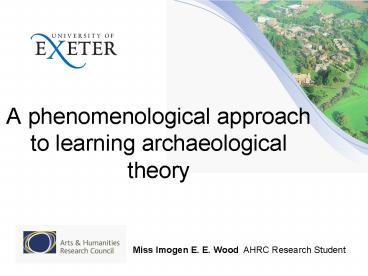A phenomenological approach to learning archaeological theory - PowerPoint PPT Presentation
1 / 16
Title:
A phenomenological approach to learning archaeological theory
Description:
... to learning archaeological theory. Miss Imogen E. E. Wood AHRC Research Student ... (Quote)' I still think the history of theory has no relevance today ... – PowerPoint PPT presentation
Number of Views:218
Avg rating:3.0/5.0
Title: A phenomenological approach to learning archaeological theory
1
A phenomenological approach to learning
archaeological theory
Miss Imogen E. E. Wood AHRC Research Student
2
Students introduction to Archaeological Theory
3
Current Student views of Theory Modules
- Discuss how they view archaeological theory
- Facebook used as forum to pool thoughts for
revision
(Quote)" I still think the history of theory has
no relevance today because, have u ever seen a
group of archaeologists sit around and discuss
the history of it, the answer being never, and
the fact that archaeologists have different views
and interpretations based on their own
experiences is obvious, so why do u need a whole
module on it. (Facebook Quote from Forum named
I fking Hate archaeological Theory)
4
Titles of Archaeological Theory Modules
- Order of popularity in UK departments
- History (development)
- Thought (thinking, debate)
- Contemporary (current, recent)
- Need to decontextualise structural approach to
- teaching theory by removing chronological labels
5
QAA Bench Mark Statement for Archaeological
Theory
- Archaeological theory is informed by
self-reflection consideration - of the material basis of archaeology, the
contested nature of objects, - the social relationships that are spun around
them and the people who - use and interpret them, have led to the
conception of the past as an - active, rather than a neutral activity, to
'facts which are theory-laden - and to issues of interpretation which cannot be
ignored or trivialised - because they are 'just' in the past. (20074).
- Social life is now conceived as interconnected,
a network of - relationships rather than simply a set of formal
structures and - institutions which need describing.
Archaeological theory addresses the - question of change and variation within such
complex webs. It draws - on the immense archive of past societies
preserved through material - remains to provide interpretations and to seek
understanding of - variation through comparison. (20074).
6
Learning in the information age
- schools remain because education is primarily
about human beings who need to meet together, as
a group of people, if learning is to take place.
- BINGHAM, C. SIDORKIN, A. M. (2004) The pedagogy
of relation an - introduction IN BINGHAM, C. SIDORKIN, A. M.
(Eds.) No education - without relation. Oxford, Peter Lang.1-4
- Learning is concerned with its experience and
environment - Rejuvenate relational aspect of teaching
7
To Let Learn
- Martin Heidegger in 1951
- Teaching is more difficult than learning because
what teaching calls for is to let learn. The
real teacher in fact, lets nothing else be
learned than learning
8
Experiential and self-reflexive approach to
teaching theory
- Theory more suited to Carl Rogers Student-Centred
-Learning - Replaces structural historic approach with
heuristic self-reflexive learning environment - Intrinsic relationship between the learner,
facilitator and the other - Conversation ideal medium for learning.
Dr. Carl Rogers
9
Publications
- Teaching Development Project on Reflective
pedagogies promoting reflexive practice in
archaeological fieldtrips Fay Stevens, UCL - Teaching Development Project on Communicating
the Excavation Experience Production of a
Training Film and Handbook - Keith Wilkinson, University of Winchester
- Teaching Development Project on Practical Work
Portfolios and Field Experience an evaluation of
modes of assessment for archaeological skills
Nyree Finlay, University of Glasgow
10
Methodology
- Aims
- The aim of this module is to develop an
understanding of archaeological theory through a
process of self-reflexive learning and
experiential involvement with the texts. - The intended learning outcomes
- Improve their verbal performance skills
- Encourage an atmosphere where ideas can be
discussed - Encourage debating skills, justify an argument
- Encourage an interpretive thinking processes
11
Assessment of Module
- Assessment
- Students will be assessed individually on
- Formative each term
- Self-reflection journals, to be submitted at end.
- Tutorials, to discuss the development of their
journals in groups. - Summative
- Verbal presentation, 10 minutes performed in
class to student peer-reviewed discussant panel.
20 - Final verbal presentation, 20 minutes based on
the exploration and critical assessment of a
concept selected by the student presented to a
staff discussant panel 80
- Self-reflection journal is to be submitted
to demonstrate the process of forming opinions
presented. Along with any supporting notes or
handouts that accompany their presentation.
12
Introduction to Philosophy
13
Self- Reflection Journals
- Forms central point throughout module
- 30 minutes after session devoted to writing
personal viewpoints positive or negative. - Used to create a quick reference theory Jargon
dictionary. - Focus of tutorials
- Used to comment on theory encountered in
different modules - Used to formulate final thoughts for assessed
final presentation.
14
Structure of Debate
Benefits 10 mins each
Disadvantages 10 mins each
Questions
5 minutes each
Followed by general comments on debate opened up
to rest of class
15
Pie in the sky?
- Sounds idealistic
- Not all students will and lectures will be
enthused - Is already a part of a new wave in thinking
- New generation of interpretive archaeologists
- A philosophy of theory
- Leave behind historical approach and incorporate
experiential and self-reflexive methods
16
- Full paper on-line
- www.hca.heaacademy.ac.uk/REAjournal
- Research in Archaeology Education Journal
- Vol 1. Issue 1.
- A phenomenological approach to learning
theory































